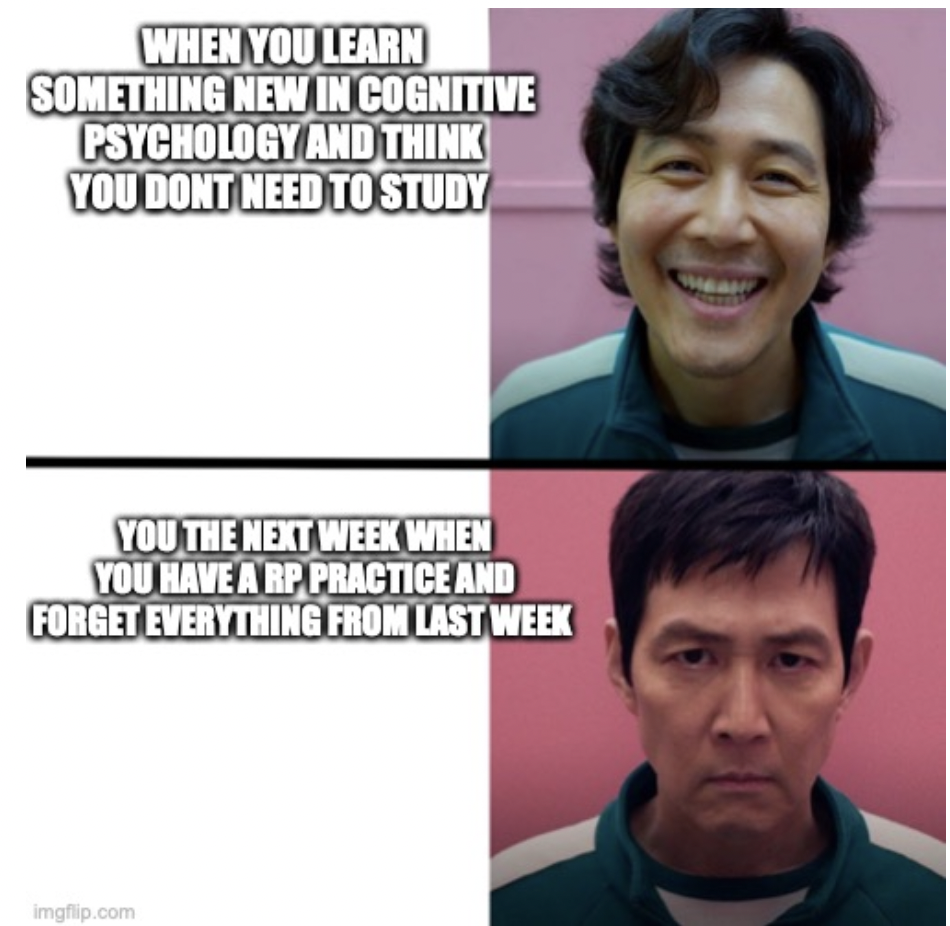By Danika Apostolovich
Introduction
Have you ever wondered why you might have studied hard for an upcoming history exam, making sure you focus on the dates, people involved, and what countries might be involved within a war, just to completely blank and forget all of the details about what you studied when the exam is given out? This is especially frustrating when you know you put in the effort to do well on the test. Let me tell you, in college this especially gets hard when you have to balance so many different things on a daily basis.
Well Did you happen to also study for that spanish test that you have the next period after? As it turns out, the material from studying for that spanish test wound up interfering with your ability to accurately remember what you studied for the history exam.
This post will dive deeper into interference theory, specifically retroactive and proactive interference. So that when you are about to go on to your first semester of college, you can know how to avoid this unfortunate circumstance of forgetting info and instead replace it with better study techniques!
What is Interference?
Interference in a concept in psychology that helps explain why someone might forget certain material after studying for a couple of different subjects. In this example, the information that you learned for the history exam was forgotten because the spanish interfered with your brain’s ability to remember the history facts.The new and old material can overlap with eachother and get scrambled in your brain, making it so you might forget some things.
The Two Types of Interference
Retroactive: new information makes it harder to remember old information
Proactive: old information makes it harder to remember new information
So in the example given earlier, if you study for history first and then Spanish, it will make it harder for you to recall the history information (Retroactive.) vs if you study Spanish first then history, the history might interfere with learning the new Spanish information (Proactive.)

Real Life Situations You May Find Yourself In
There are many different scenarios that you may find yourself in that can lead to interference of information. An example of this might be if you were to study history and political-science back to back, they both have similar concepts in them that may overlap and lead to more confusion. Studying similar subjects too soon after each other without any kind of break makes your brain work in overdrive. This can lead to overloading your working memory and causes information to scramble in your brain. In the study by Chandler (1989.) 1! it states how studying similar subjects in a consecutive time period can hurt your memory and performance. So if you are thinking about pulling an all nighter before final exams to cram and study for all your finals at once, you might want to rethink that!
Working Memory and Interference
Your working memory is the part of your brain that is responsible for temporarily holding and processing information. This part can easily become overwhelmed when interference is experienced. The overload is known as cognitive load, which explains why its harder to observe or learn the information that you are trying too. Your brain cannot juggle too much at once without some kind of interference occuring. The more you overload your working memory, the more likely it is to remember things clearly.
How to Outsmart Forgetting
There are a couple of different things you can to to reduce interference and help your brain remember things more clearly and effectively.

Spacing Things Out a Little
Spreading out studying over a period of time to separate similar content which makes it so that your brain has enough time to process and store information without overload occuring. This is a highly effective strategy for preventing interference because it gives your brain a lot more time to consolidate the information that is being learned between study sessions. This is because it helps form a stronger connection between your brain and the material being learned. After a delay in learning information, when you revisit something it is able to reinforce the memory trace that is already there. Spacing out your studies and reviewing information multiple times rather than cramming is a very effective way to help you memorize information for your exams.
The Use of Interleaving
This is when you mix in different subjects together during study time, but try your best to avoid content that is super similar back to back. Research has shown that spacing different kinds of material that has more similarities can increase retention and distinction between them. Making sure that that content you are studying is distinctively different from each other if you are studying in a consecutive time period. This is a good strategy to use when you have a lot of different exams coming up. Making sure you can still effectively study for each subject but not studying two things that are very similar back to back (like history and political science.)
Maintaining Focused Attention
Making sure to keep you attention soley on the topic that you are learning about. This means keeping any distractions (yes tiktok) away from you when you are trying to study the information you need for that exam coming up. Avoiding multitasking is very important as well, if you divide your attention and are not truly putting all your focus into the work, the probability of your brain forgetting more information increases.
Getting Some Extra Z’s
Sleeping has been shown to help reinforce memories. Through proper rest, a person can help prevent retroactive interference. Sleep plays a cruical role in memory consolidation, which helps you retain your memories for extended periods of time longer. The transfer from short-term memory to long-term memory can often be done more affectively by getting enough sleep to help your brain process.
In Conclusion
All in all, as a new college student, understanding what interference is and exactly how it affects your memory is a great tool to use to help aid your pursuit in learning new subjects. To help you retain what you learn in class, try to space out your study sessions over a period of time instead of cramming similar topics together. Try to use interleaving if you really need to mix subjects together. Trust me, I know how easy it is to procrastinate and wait until the last minute, but if you wanna maintain your grades, this is a great way to aid your memory. Let’s also not forget that sleep is not only good for your body, but essential for your brains health and wellbeing, so take care of your mind!
- By, McLeod, S., on, U., & 19, A. (2025, April 19). Proactive & retroactive interference: Definition & examples. Simply Psychology. lhttps://www.simplypsychology.org/proactive-and-retroactive-interference.html
2. Crossley, M., Lorenzetti, F. D., Naskar, S., O’Shea, M., Kemenes, G., Benjamin, P. R., & Kemenes, I. (2019, June 26). Proactive and retroactive interference with associative memory consolidation in the snail lymnaea is time and circuit dependent. Nature News. https://www.nature.com/articles/s42003-019-0470-y
3. Janbek, G. (2024, November 29). Longdom Publishing SL: Open access journals. Longdom. https://www.longdom.org/open-access/interference-theory-of-forgetting-and-its-impact-on-memory-1101397.html
4. Sosic-Vasic, Z., Hille, K., Kröner, J., Spitzer, M., & Kornmeier, J. (2018, February 16). When learning disturbs memory – temporal profile of retroactive interference of learning on memory formation. Frontiers in psychology. https://pmc.ncbi.nlm.nih.gov/articles/PMC5820352/
5. Darby, K. P., & Sloutsky, V. M. (2015, April). The cost of learning: Interference effects in memory development. Journal of experimental psychology. General. https://pmc.ncbi.nlm.nih.gov/articles/PMC4388774/
6. Proactive interference. RSS. (n.d.). https://www.structural-learning.com/post/proactive-interference
Hi Danika, I found your post very insightful and relatable. As someone taking multiple psychology courses, I tend to find myself dealing with both retroactive and proactive interferences. I sometimes get information from one class mixed together with information from another class or, I’ll be studying a specific topic for one class, and then it’s brought up in a difference class though explained in a different way and the way I first learned it interferes with the new way I’m supposed to learn it. You mentioned using interleaving as a technique to avoid inference, and while I can see that working for very different subjects, like statistics and historical literature, how would someone like me who’s taking psychology classes use such a technique? Or do you know of a better method for me to avoid interference while studying? I would love to know. Overall, I really enjoyed your post, and it helped me gain a deeper understanding of just how even the smallest interference, whether proactive or retroactive, can have a big impact on working and short-term memory.
Hi Danika, I really appreciated your post; it made me reflect on how I sometimes experience interference without even realizing it. As a student juggling multiple classes, I often find myself mixing up terms and concepts, especially when the topics are closely related. For example, i’m currently taking both cognitive psychology and mid/child adolescent development, and sometimes the overlapping material, like social cognition or language, starts to blue together, making it harder to remember specific details during exams. You mentioned strategies like spacing and interleaving, which sound really helpful, but i’m curious as to what advice you would give to someone studying similar material across different classes? Are there any specific techniques that help show distinctions between overlapping topics, especially when both subjects use similar vocab? Thank you again for the great post, it was really insightful!
Hi Danika; I really appreciated your post for a few reasons. It explains the concepts of interference nicely- It’s something I personally experience sometimes, even when my major focus is psychology and I feel like all the knowledge should be grouped. I think it’s intriguing that the more information is in the brain, the more difficulty one can find in trying to actually organize it. It makes sense from a standpoint of looking at it in the same way one might look at an office desk, or a messy backpack, but most people don’t choose to apply that metaphor to the brain. In any case, great work on the post!